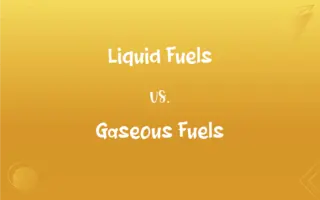Acetoxy Silicone vs. Neutral Cure Silicone: What's the Difference?
By Harlon Moss & Janet White || Published on March 28, 2024
Acetoxy silicone sealant cures by releasing acetic acid, leading to a vinegar-like odor, and is known for its strong adhesion and quick curing time. Neutral cure silicone cures without emitting strong odors, making it more suitable for indoor use.
Key Differences
Acetoxy silicone is ideal for non-porous surfaces like glass and metal, where its rapid curing and strong bond are advantageous. However, its acetic acid byproduct can corrode certain materials, like concrete and copper. Neutral cure silicone, free from acidic byproducts, is compatible with a wider range of materials, including metals and masonry, without causing corrosion.
The curing process distinguishes these sealants: acetoxy silicone's acetic acid emission speeds up curing but limits its use with sensitive materials. Neutral cure silicone, curing without harmful byproducts, takes longer but offers greater material compatibility.
Acetoxy silicone's quick cure time is beneficial for projects requiring fast completion, whereas neutral cure's slower process reduces the risk of shrinkage and provides a more flexible finish.
In terms of applications, acetoxy silicone is often used in areas where speed and adhesion are critical, such as in window and aquarium sealing. Neutral cure silicone's versatility and lack of odor make it preferred for indoor applications, electronics, and where material sensitivity is a concern. Despite their differences, both sealants provide excellent waterproofing and durability, with the choice depending on specific project requirements and material sensitivities.
Comparison Chart
Curing Byproduct
Acetic acid, vinegar-like odor
No strong odors, often alcohol
ADVERTISEMENT
Material Compatibility
Best for non-porous surfaces; can corrode some materials
Suitable for a wide range of materials, including porous surfaces
Curing Time
Fast
Slower than acetoxy
Applications
Glass, ceramics, non-corrosive metals
Indoors, electronics, sensitive materials
Adhesion
Strong, particularly on glass and metal
Versatile, strong on various surfaces
Acetoxy Silicone and Neutral Cure Silicone Definitions
Acetoxy Silicone
Not suitable for all materials.
Its acidic nature makes acetoxy silicone less suitable for porous materials like stone.
ADVERTISEMENT
Neutral Cure Silicone
Slower curing process.
Neutral cure silicone takes longer to set, allowing more time for application adjustments.
Acetoxy Silicone
Vinegar smell upon curing.
The strong vinegar odor during acetoxy silicone curing is noticeable but indicates a strong bond formation.
Neutral Cure Silicone
Ideal for sensitive applications.
Its non-acidic curing makes it suitable for electronic components and delicate materials.
Acetoxy Silicone
Excellent adhesion to glass.
Acetoxy silicone is often used for aquariums due to its strong bond with glass.
Neutral Cure Silicone
Minimal odor during curing.
The lack of a strong odor makes neutral cure silicone preferable for indoor use.
Acetoxy Silicone
Corrosive to certain metals.
Use of acetoxy silicone on copper or brass can lead to corrosion due to acetic acid release.
Neutral Cure Silicone
Broad material compatibility.
Its non-corrosive nature makes it safe for metals, masonry, and plastics.
Acetoxy Silicone
Rapid cure time.
Acetoxy silicone quickly becomes tack-free, making it ideal for projects needing fast completion.
Neutral Cure Silicone
Flexible and durable finish.
Neutral cure silicone provides a flexible seal that withstands temperature changes and movement.
FAQs
Is acetoxy silicone faster to cure than neutral cure silicone?
Yes, acetoxy silicone typically cures faster, making it suitable for projects requiring quick completion.
Why does acetoxy silicone smell like vinegar?
The vinegar-like odor comes from acetic acid released during the curing process.
Why choose neutral cure silicone for indoors?
Its minimal odor and lack of corrosive byproducts make it safer and more pleasant to use in enclosed spaces.
Can acetoxy silicone damage certain materials?
Yes, its acetic acid byproduct can corrode sensitive materials like concrete and certain metals.
What is acetoxy silicone?
Acetoxy silicone is a sealant that cures to release acetic acid, known for its strong adhesion and rapid curing time.
Can neutral cure silicone be used on all surfaces?
While it's compatible with many materials, it's always best to check compatibility, especially with very specific or unusual surfaces.
How does temperature affect the curing of these silicones?
Higher temperatures can accelerate curing for both types, but it's more noticeable with acetoxy silicone due to its faster overall curing rate.
What safety precautions are necessary when using acetoxy silicone?
Adequate ventilation is crucial due to the acetic acid vapors released during curing, which can irritate the respiratory system and eyes.
Can paint adhere to acetoxy or neutral cure silicone?
Generally, silicone sealants are not paintable. Special paintable silicone sealants or specific surface treatments are required for paint to adhere.
What distinguishes neutral cure silicone?
Neutral cure silicone cures without releasing acidic byproducts, making it suitable for a wider range of materials and indoor use.
Where is neutral cure silicone most effectively used?
It's ideal for indoor applications, electronics, and materials sensitive to corrosion.
What is the shelf life of acetoxy and neutral cure silicone sealants?
Unopened, both types typically have a shelf life of about 12 months, but it's important to store them in cool, dry conditions to preserve their quality.
What are common uses of acetoxy silicone?
It's often used in applications like glass sealing and non-porous surface bonding where strong adhesion is needed.
What are the best practices for applying silicone sealants for optimal performance?
Surface preparation is key: ensure surfaces are clean, dry, and free of dust or grease. Applying in optimal weather conditions and following the manufacturer's instructions will also enhance the sealant's performance and durability.
How long do these silicone sealants last once applied?
Both types are designed for long-term durability, often lasting up to 20 years or more, depending on environmental conditions.
How does UV exposure affect these silicones?
Both acetoxy and neutral cure silicones are generally resistant to UV light, making them suitable for outdoor use, though long-term exposure can eventually lead to degradation.
How does the choice between acetoxy and neutral cure silicone impact project costs?
Neutral cure silicones may be more expensive due to their advanced formulations, but the choice should also consider potential damage to sensitive materials by acetoxy silicones.
Are there any environmental considerations when choosing between these silicones?
Neutral cure silicones are often preferred for environmentally sensitive applications due to their non-corrosive nature and lower VOC emissions during curing.
How do temperature and humidity affect the curing process of these silicones?
High humidity can accelerate the curing process for both types, while extreme temperatures can either slow down or speed up curing, depending on the specific product formulation.
Can acetoxy silicone be used for exterior applications?
Yes, acetoxy silicone is suitable for exterior applications, especially where strong UV resistance and waterproofing are required, but its corrosive nature should be considered.
About Author
Written by
Harlon MossHarlon is a seasoned quality moderator and accomplished content writer for Difference Wiki. An alumnus of the prestigious University of California, he earned his degree in Computer Science. Leveraging his academic background, Harlon brings a meticulous and informed perspective to his work, ensuring content accuracy and excellence.
Co-written by
Janet WhiteJanet White has been an esteemed writer and blogger for Difference Wiki. Holding a Master's degree in Science and Medical Journalism from the prestigious Boston University, she has consistently demonstrated her expertise and passion for her field. When she's not immersed in her work, Janet relishes her time exercising, delving into a good book, and cherishing moments with friends and family.
































































